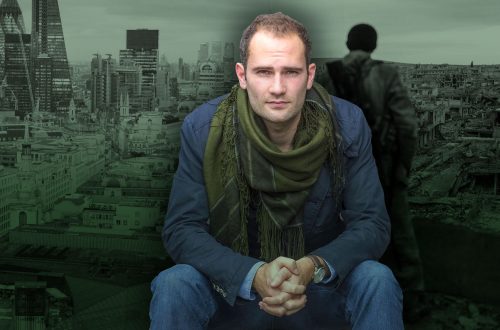Readers may or may not know that the official organ of the Communist Party of Britain, the Morning Star, has recently become free to view on the internet.
While reading the letters page earlier this morning I came across evidence for the view that while an uncomfortable number of leftists currently view Islamism and its practitioners through rose-tinted sunglasses, the malaise is not neccessarily widespread and terminal.
Exhibit A is a depressing letter from Keith Flett of Tottenham – prolific correpondent to the press, proud beard-wearer and long-time SWP member.
Here’s what he says about recent events in Gaza:
ISRAEL, a nuclear armed power, reacts to alleged rocket attacks from inside Gaza by air strikes that kill and injure hundreds.
The action is disproportionate and almost certainly illegal under international law. Normally, Western powers faced with such a situation would cut off diplomatic ties and threaten to send troops.
In fact all that has happened is that Israel has been asked to be a bit more careful in future. If anyone is looking for the root cause of continuing terrorism originating in the Middle East, here would be a good place to start.
KEITH FLETT
London N17
Writing to a newspaper to condemn Israel’s recent air-strikes on Gaza is a perfectly proper thing to do – something not normally deserving of comment; it would also be wrong to take umbrage at the mistaken confidence with which Flett delivers his rather pat legal view – a wry smile is the correct response to such an amateur ‘analysis’. What should, however, be objected to is the fact that someone who describes himself as a historian decided to refer to ‘alleged rocket attacks from inside Gaza’. Wouldn’t it be more honest to drop the word ‘alleged’? After all, no-one in the world, not even Hamas are denying the fact of the rocket attacks.
Left-wingers don’t do their credibility any good whatsoever by trying to pretend Hamas rocket attacks aren’t real – as if they’re merely a convenient but mythical pretext for inexplicable Israeli violence or a figment of a hysterical collective imagination. Writing in such weaselly terms merely identifies the signatory as a person who has no compunction about arguing publicly in bad faith if it suits their current political line: in short it’s a handy way to advertise long-term membership of a political party, the SWP, in which mendacity is not only the unchallenged norm, but a way of thinking that has become internalised among its adherents to the extent that they don’t realise they’re doing it.
It is all rather depressing, but a second letter made me think there was still some hope for the survival of a Left without starry-eyed illusions in the ultimate aim of Islamists. It was a report on recent attacks on democratic rights in the world’s first Islamic Republic.
Short extracts below:
The new year in Iran has started where 2008 left off for Nobel Peace prize laureate and human rights lawyer Shirin Ebadi. Five government agents posing as tax officials raided her offices this week.
This follows last week’s raid upon the offices of the Centre for the Defence of Human Rights, when a gathering to commemorate the 60th anniversary of the Universal Declaration of Human Rights was disrupted and the offices were closed down.
Ebadi’s harassment is part of an ongoing campaign to discredit her and undermine the campaigns for peace and human rights in Iran with which she is associated.
In recent days, groups of pro-regime zealots have gathered in front of Ebadi’s house, writing slogans against her on the walls accusing her of being a US agent.
The letter was sent from Jamshid Ahmadi, Assistant General Secretary of the Committee for the Defence of the Iranian People’s Rights, and someone more than familiar with the fate of Iranian leftists in his homeland:
Here’s a recap for those who need reminding of what happened to the once powerful Tudeh Party as the Iranian Islamists gradually consolidated power after 1979:
While almost all other leftist parties opposed the Islamist forces at this time, and were suppressed as a result, the Tudeh Party leadership decided to collaborate with the new clerical theocratic regime. This may have been to try and take advantage of the lack of competition from the many now suppressed rival leftist groups, or to follow the pro-Tehran line of the Soviet Union.
In 1982, however, the Tudeh broke ranks. The Islamist government of Iran had closed down the Tudeh newspaper, and purged Tudeh members from government ministries. It pushed back the invading Iraqi army and had decided to advance into Iraqi territory despite having recovered most of Iranian territory. The Tudeh urged acceptance of a UN peace offer and warned that continuation of the war would `play into the hands of the imperialists.` Quite quickly the government arrested and imprisoned its leadership and later more than 5,000 members and supporters of the party. The party was banned in 1983.
From May 1 1983 to May 1984 almost all the Tudeh leadership appeared in videos, first individually and then jointing in an October 1983 a “roundtable discussion,” confessing to “treason”, “subversion”, “horrendous crimes”, praising Islam and proclaiming Islamic government’s superiority over atheistic Marxism-Leninism.
“The grand finale” of the Tudeh recantations came on May 1984 when the “party’s main theoretician” and co-founder, Ehsan Tabari, appeared on television. A man with “50 years of leftist experiences” told viewers he had read “great Islamic thinkers” such as Ayatollah Motahhari in prison following the 1982 crackdown and had now come to repudiate the works he had written over the past 40 years. He now realized that his entire life’s work was `defective`, damaging`, and `totally spurious` because it had all been based on unreliable thinkers – Freemasons nourished by the Pahlavis; secularists such as Ahmad Kasravi Western liberals and Marxists linked to `imperialism` and `Zionism`.
Tabari’s made frequent references to religion, the Twelve Imams and Islamic thinkers in his recantation and “praised Islam for its `great spiritual strength.`”
Belief by outside observers that the confession were not given freely was reinforced by the conspicuous absence of Taqi Keymanash and “13 other members” of the Tudeh central committee, who died during prison interrogation.
Keith Flett and all his fellow-travellers in the SWP may be well advised to dwell on the aphorism that those who cannot remember the past are often condemned to repeat it.


